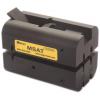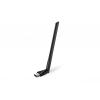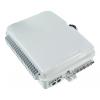-
$

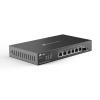
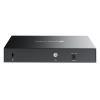
The TP-Link ER707-M2 is a router designed to work within the Omada system. It features 2 2.5G Ethernet ports, 4 gigabit Ethernet ports, and 1 SFP slot. Each port can function as a WAN, allowing you to bring signals from multiple internet service providers to the router for failover redundancy. The first 2.5G Ethernet port operates solely as a WAN, while the remaining interfaces support WAN/LAN modes. This device stands out for its high routing performance, capable of handling NAT throughput of 2364/2366 Mb/s. Its main advantage lies in its compatibility with various VPN connections, including GRE tunnels, WireGuard, IPsec, and OpenVPN. It is particularly useful for connecting locations within a large network securely via VPN tunnels to the main network resources. The ER707-M2 can be utilized in various scenarios, especially when paired with Omada access points, such as in small businesses. Additionally, it can function as an independent, efficient router.
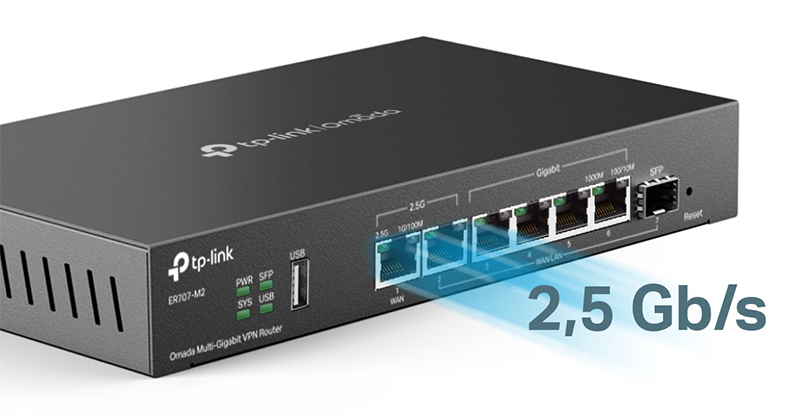
2x 2.5G Ethernet, 4x 1G Ethernet, 1x SFP
By utilizing the 2.5G Ethernet ports, the router ensures high-throughput connections. You can create a network backbone using speeds of up to 2500 Mb/s, significantly higher than standard 1G networks.
An additional advantage is the SFP slot, which can be utilized for fiber optic connections. It supports both WAN and LAN modes, allowing you to use it for bringing in signals from service providers or connecting distant segments of the local network.
Multiple WAN ports
Each of the Ethernet/SFP ports can function as a WAN port. This capability allows you to utilize services from multiple internet service providers to ensure connection reliability. The router supports Multi-WAN link balancing, distributing data streams based on the bandwidth proportions of each port. Additionally, the USB 2.0 port can be used to connect an external 3G/4G modem, providing an additional failover connection.

VPN connections
The ER707-M2 supports multiple VPN protocols, including GRE tunneling, IPSec, SSL, Wireguard, PPTP, and L2TP. This is a crucial feature, especially if you are deploying the router within a larger network consisting of several geographically dispersed locations. With VPN connections, the ER707-M2 can communicate with the main location to create an extensive network, facilitating secure communication and data exchange across the network.
The device features hardware data encryption support, ensuring excellent performance and enabling high throughput.
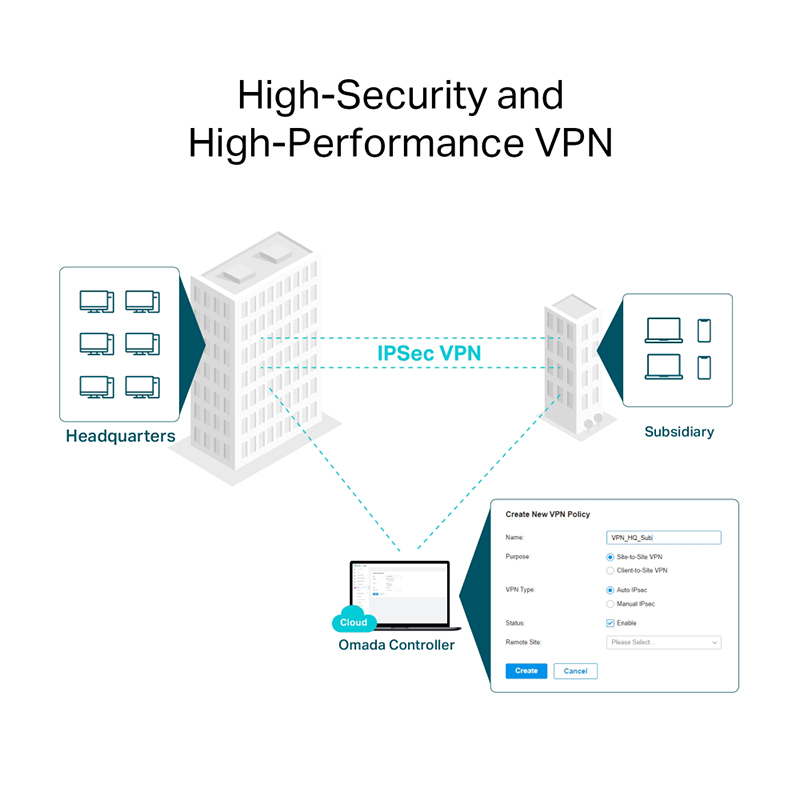

DoS protection
The router detects and blocks various types of DoS (Denial of Service) attacks, such as TCP/UDP/ICMP flooding and Ping of Death.
VLAN support
You can create virtual networks to divide the network into segments and separate individual segments from each other to increase security.


Firewall
An advanced firewall protects your network and the data transmitted through it.
IP / MAC / URL filtering
Filtering can protect you from viruses and various types of external attacks.


IP-MAC Binding
Static IP reservation for clients helps protect against spoofing and ARP attacks.
One-Click ALG Activation
With a single click, you can activate the ALG (Application Layer Gateway) protocol for FTP, H323, SIP, IPsec, and PPTP protocols.


Network access management
The Omada platform provides administrators with powerful tools for controlling network access. You can utilize a captive portal (welcome page) that allows access to the network through account creation, vouchers, or SMS codes. The system is also compatible with RADIUS server and LDAP protocol.
You can segment network access based on client types, such as separating networks for guests, employees, and management, ensuring that each network does not have access to the resources of others. An additional advantage is the ability to filter IP/MAC/URL addresses and implement access control lists (ACLs).
Omada SDN
The SDN (Software Defined Networking) platform is used to integrate all compatible devices and provides centralized management from the cloud. You can create a very large network that you will manage from a single point. The key advantage of Omada SDN is its high scalability. Expanding the network with additional segments or interfaces is straightforward and does not involve significant downtime.
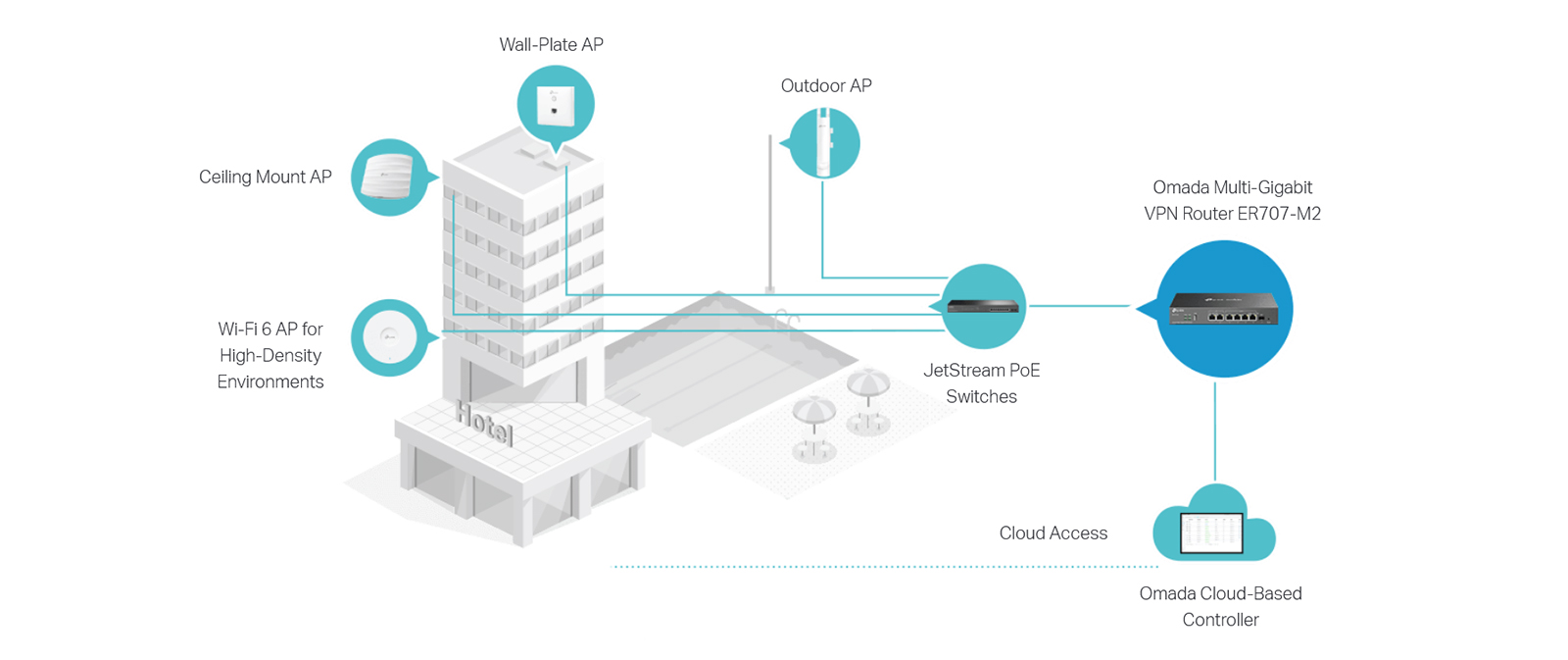
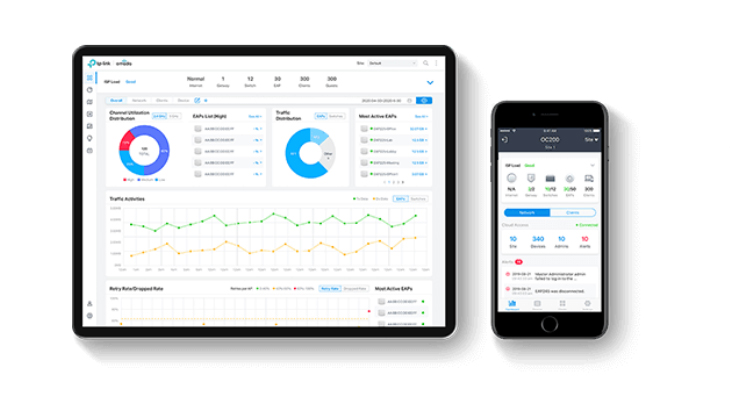
Cloud access
Full access to network management and configuration can be achieved via the cloud. This access is available from anywhere in the world at any time.
Omada application
You can utilize the Omada mobile application available on Android/iOS devices for network management and configuration. The initial setup involves a few simple steps, which the application will guide you through quickly. You can manage the ER707-M2 both in standalone mode and controller mode.
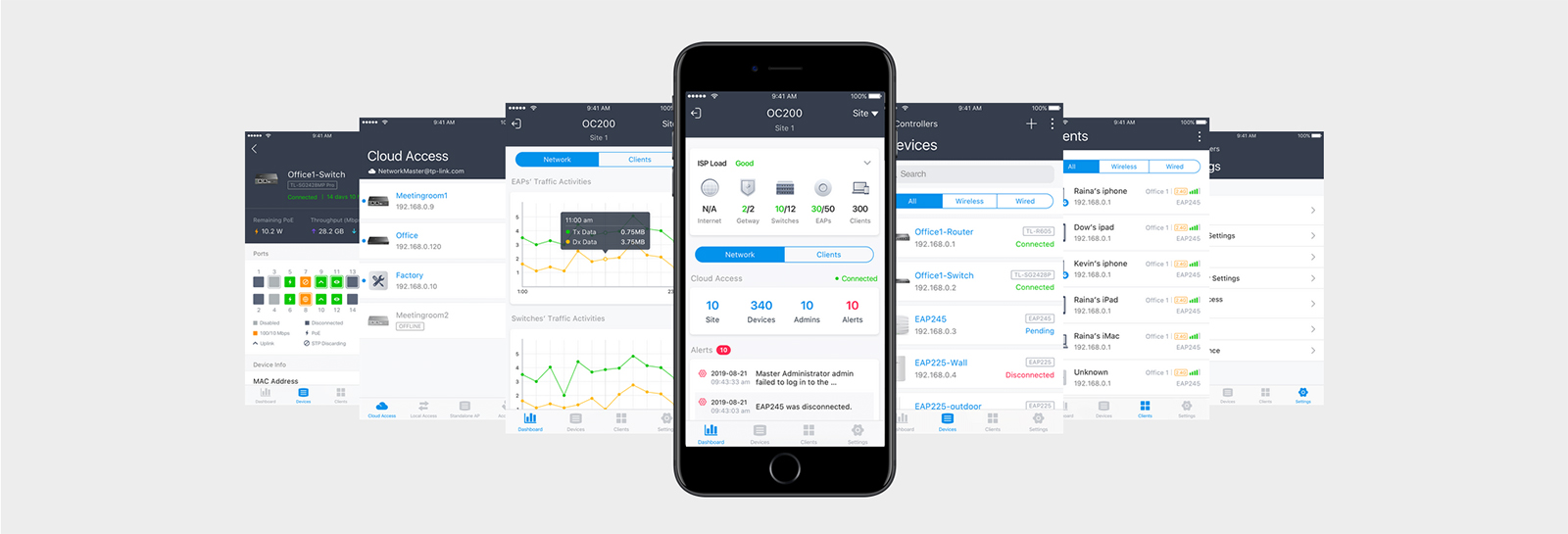
Specifications
| TP-Link ER707-M2 | |
| Security | |
|---|---|
| Access Control | Source/Destination IP Based Access Control |
| Filtering | WEB Group Filtering URL Filtering Web Security |
| ARP Inspection | Sending GARP Packet ARP Scanning IP-MAC Binding |
| Attack Defense | TCP/UDP/ICMP Flood Defense Block TCP Scan (Stealth FIN/Xmas/Null) Block Ping from WAN |
| Hardware features | |
| Standards and Protocols | IEEE 802.3, IEEE802.3u, IEEE802.3ab, IEEE802.3z, IEEE 802.3x, IEEE 802.1q, IEEE802.3bz TCP/IP, DHCP, ICMP, NAT, PPPoE, NTP, HTTP, HTTPS, DNS, IPSec, PPTP, L2TP, OpenVPN, SNMP, WireGuard VPN |
| Interface | 1× 2.5G RJ45 WAN Port 1× 2.5G RJ45 WAN/LAN Port 1× Gigabit SFP WAN/LAN Port 4× Gigabit RJ45 WAN/LAN Ports 1× USB 2.0 Port (Supports USB storage, and LTE backup with LTE dongle) |
| Network Media | 10BASE-T: UTP category 3, 4, 5 cable (Max 100 m) EIA/TIA-568 100Ω STP (Max 100 m) 100BASE-TX: UTP category 5, 5e cable (Max 100 m) EIA/TIA-568 100Ω STP (Max 100 m) 1000BASE-T: UTP category 5, 5e, 6 cable (Max 100 m) 2500BASE-T: UTP category 5, 5e, 6 cable (Max 100 m) |
| Cooling | Passive |
| Button | Reset |
| Power Supply | 12V/1.5A Adapter |
| Flash | 128 MB NAND |
| DRAM | 1 GB DDR4 |
| LED | PWR, SYS, SFP, USB, WAN (Speed, Link/Act), LAN (Speed, Link/Act) |
| Dimensions ( W x D x H ) | 8.9 × 5.2 × 1.4 in (226 × 131 × 35 mm) |
| Protection | 4 kV surge protection |
| Enclosure | Steel |
| Mounting | Desktop/Wall Mounting |
| Max Power Consumption | 14.2 W (with USB2.0 connected) 7.1 W (without USB2.0 connected) |
| Performance | |
| IPS Throughput | TCP: 208 Mbps; UDP: 161 Mbps |
| DPI Throughput | TCP: 1823 Mbps; UDP: 1272 Mbps |
| Concurrent Session | 500,000 |
| New Sessions /Second | 6,000 |
| NAT (Static IP) | 2365.17 Mbps / 2364.45 Mbps |
| NAT (DHCP) | 2364.45 Mbps / 2366.04 Mbps |
| NAT (PPPoE) | 2347.14 Mbps / 2348.29 Mbps |
| NAT (L2TP) | 1308.86 Mbps / 974.10 Mbps |
| NAT (PPTP) | 1236.27 Mbps / 1280.99 Mbps |
| IPsec VPN Throughput | ESP-SHA1-AES256: 673.3 Mbps ESP-SHA256-AES256: 650.2 Mbps ESP-SHA384-AES256: 629.3 Mbps ESP-SHA512-AES256: 633.8 Mbps |
| L2TP VPN Throughput | Unencrypted: 1243.7 Mbps Encrypted: 561.0 Mbps |
| SSL VPN Throughput | 132.24 Mbps |
| 66 Byte Packet forwarding rate | 1832.69 Mbps / 1741.84 Mbps |
| 1,518 Byte Packet forwarding rate | 2461.18 Mbps / 2457.32 Mbps |
| Basic functions | |
| WAN Connection Type | IPv4_Static IP IPv4_Dynamic IP IPv4_PPPOE IPv4_L2TP IPv4_PPTP IPv6_PPP IPv6_DHCPv6 IPv6_Static IP IPv6_6in4 IPv6_Pass-Through Mobile Broadband: 4G/3G modem for backup via USB port |
| MAC Clone | Modify WAN/LAN MAC Address |
| DHCP | • DHCP Server • DHCPv6 PD Server (only in Standalone Mode) • DHCP Options Customization • DHCP Address Reservation • Multi-IP Interfaces* • Multi-Net DHCP* |
| IPv6 | StaticIP / SLAAC / DHCPv6 / PPPoE / 6to4Tunnel / PassThrough / Non-Address mode |
| VLAN | 802.1Q VLAN |
| IPTV | IGMP v2/v3 Proxy, Custom Mode, Bridge Mode |
| Advanced functions | |
| Advanced Routing | Static Routing Policy Routing RIP (only in Standalone Mode) OSPF (only in Standalone Mode) |
| Bandwidth Control | Guarantee & Limited Bandwidth Guarantee & Limited BandwidthIP/port |
| Load Balance | • Intelligent Load Balance • Application Optimized Routing • Link Backup (Timing§, Failover) • Online Detection |
| NAT | • One-to-One NAT§ • Multi-Net NAT • Port Forwarding • Port Triggering§ • NAT-DMZ • FTP/H.323/SIP/IPSec/PPTP ALG • UPnP |
| Session Limit | IP-based Session Limit |
| VPN | |
| IPsec VPN | 100 IPSec VPN Tunnels LAN-to-LAN, Client-to-LAN Main, Aggressive Negotiation Mode DES, 3DES, SHA1, AES128, AES192, AES256 Encryption Algorithm IKEv1/v2 MD5, SHA1, SHA2-384 and SHA2-512 Authentication Algorithm NAT Traversal (NAT-T) Dead Peer Detection (DPD) Perfect Forward Secrecy (PFS) |
| PPTP VPN | PPTP VPN Server PPTP VPN Clients (12) 60 Tunnels (Shared with L2TP) PPTP with MPPE Encryption |
| L2TP VPN | L2TP VPN Server L2TP VPN Clients (12) 60 Tunnels (Shared with PPTP) L2TP over IPSec |
| OpenVPN | OpenVPN Server OpenVPN Clients (6) 66 OpenVPN Tunnels |
| Authentication | |
| Web Authentication | • No Authentication • Simple Password • Hotspot (Local User/Voucher* /SMS*/Radius*) • External Radius Server • External Portal Server* • LDAP |
| Management | |
| Omada App | Yes. Requiring the use of OC300, OC200, Omada Cloud-Based Controller, or Omada Software Controller. |
| Centralized Management | Omada Cloud-Based Controller Omada Hardware Controller (OC300) Omada Hardware Controller (OC200) Omada Software Controller |
| Cloud Access | Yes. Requiring the use of OC300, OC200, Omada Cloud-Based Controller, or Omada Software Controller. |
| Service | Dynamic DNS (Dyndns, No-IP, Peanuthull, Comexe) |
| Maintenance | Web Management Interface Remote Management Export & Import Configuration SNMP v1/v2c/v3 Diagnostics (Ping & Traceroute) NTP Synchronize Port Mirroring CLI (only in Standalone Mode) Syslog Support |
| Zero-Touch Provisioning | Yes. Requiring the use of Omada Cloud-Based Controller. |
| Management Features | Automatic Device Discovery Intelligent Network Monitoring Abnormal Event Warnings Unified Configuration Reboot Schedule Captive Portal Configuration ZTP (Zero-Touch Provisioning) |
| Others | |
| Package Contents | ER707-M2 Power Adapter Quick Installation Guide |
| System Requirements | Microsoft Windows 98SE, NT, 2000, XP, Vista™ or Windows 7/8/8.1/10, MAC OS, NetWare, UNIX or Linux |
| Operating Temperature | 0–40 ℃ (32–104 ℉); |
| Storage Temperature | -40–70 ℃ (-40–158 ℉) |
| Operating Humidity | 10–90% RH non-condensing |
| Storage Humidity | 5–90% non-condensing |






 Polski
Polski English
English Italiano
Italiano Español
Español Čeština
Čeština Српски
Српски Deutsch
Deutsch Ελληνικά
Ελληνικά Slovenský
Slovenský


